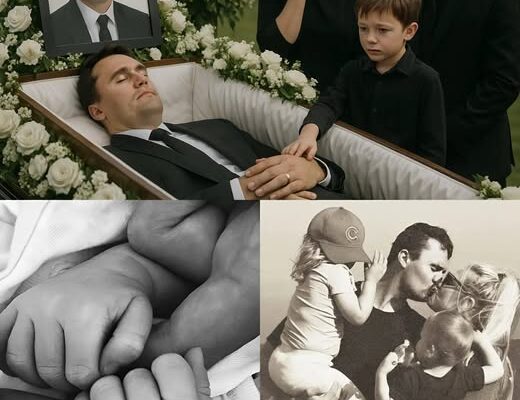A Wife’s Agonizing Vigil
For Erika, those final moments have now become seared into memory. She described how she refused to release his hand, her fingers interlaced with his, willing him to return. She recalled a faint squeeze, a fleeting flicker of connection—what she now calls “the last handshake.”
“It was like he was telling me he loved me one last time,” she said quietly to those close to her afterward. “I’ll never forget it.”
That gesture, so small and yet so profound, now carries the weight of finality. For a couple that had built a life together under the intense glare of public scrutiny, the end came not with speeches or grand declarations, but with a silent touch in a dimly lit hospital room.
The Child’s Question That Broke the Silence
The rawness of a child’s grief often cuts more deeply than the controlled composure of adults. Children do not couch their questions in euphemism. They ask what everyone is thinking but no one dares to articulate. And that is why the daughter’s anguished cry—“Why won’t Daddy get up?”—shook even hardened medical staff.
One nurse later confided that in all her years of working in intensive care, nothing had unsettled her more than that moment. “We are trained to keep calm and professional,” she said. “But when a child puts words to the very pain everyone else is drowning in, it pierces straight through you. There are no protocols for that.”

Psychologists note that children often perceive death differently, especially when they witness it firsthand. They grapple with the physical absence but lack the framework adults use to buffer grief. The question that stunned the room was not simply naïve—it was deeply existential. Why does someone who has always risen before, who has always been present, suddenly not get up? For a child, the permanence of death collides with the expectation of continuity, creating a grief that is both piercingly simple and unbearably complex.
Public Figure, Private Loss
Charlie Kirk was, in the eyes of millions, a public figure—polarizing, influential, and rarely out of the national spotlight. His name carried with it both admiration and criticism. Yet in that hospital room, none of that mattered. The cameras were gone, the speeches silenced, the political battles irrelevant. What remained was a wife losing her husband and a daughter asking a question too painful to answer.
The collision of public and private grief is a unique burden borne by the families of prominent figures. To the world, Charlie Kirk was a commentator, a movement leader, a voice that sparked debates. To Erika and her daughter, he was simply a husband and a father—the man who made pancakes on Saturday mornings, who tucked his daughter into bed, who filled their home with laughter and arguments that had nothing to do with politics
This duality underscores the human dimension often erased in the public sphere. In life, figures like Kirk are magnified beyond recognition; in death, they are stripped down to their most intimate roles. The “last handshake” is not a political symbol—it is a human one.
The Symbolism of the Last Handshake
That final squeeze of the hand has already become a motif for those close to the family. Some interpret it as an expression of love, a farewell encoded in touch rather than words. Others see it as a gesture of reassurance—his way of telling Erika that she would carry on, even without him.

There is something profoundly universal in this image. Across cultures and centuries, the hand has been a symbol of connection—of holding on, of not letting go, of bridging the gap between presence and absence. In this case, it became the couple’s final language.



